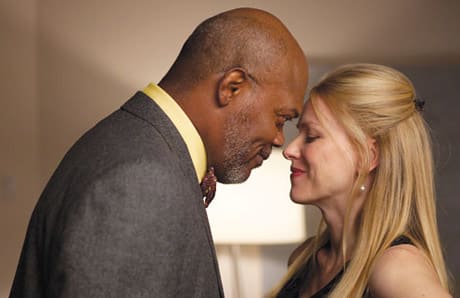Mother and Child is one of those movies where I genuinely wish I had walked out of the theatre without seeing the last half-hour (up until Naomi Watts has a rooftop conversation with a wise-beyond-her-years, blind teenager). The film leading up the final painfully contrived and overwhelmingly manipulative moments is wise, deeply moving and occasionally profound. So much so that I can easily forgive its need to spell out the obvious "we're all connected" message that has been the staple of ensemble films since Mr. Inarritu brought everyone together through car crashes and dog fights ten years ago.
The ensemble here is comprised of three women in different stages of life with different scars in relation to their mother, child, or lack thereof. Karen (Annette Bening) is a woman in her early 50s that lives with her dying mother. Having given up a daughter she birthed at the age of 14, she feels a hole in her life, struggling to connect with others, as she's overly critical and tactless. Similarly honest and blunt is Elizabeth (Naomi Watts), a high-powered attorney in her late 30s that takes what she wants from life, depending only on herself.
The last storyline covers Lucy's (Kerry Washington) struggles with adoption after discovering she's unable to conceive. While necessary, and performed intelligently by Washington, this narrative thread carries the least weight. In giving the full picture of a woman as caregiver and unspoken maternal instincts, she represents the immediacy and loss of self associated with motherhood.
Watts and Bening steal the show, bringing to life the kinds of characters that are usually reduced to caricature. People that look at the world soberly and with distrust, saying things others don't want to hear or deal with. It's pretty fantastic, and watching Naomi Watts introduce Samuel L. Jackson to her phoney yuppie neighbours as her father is one of the most inspired moments in film thus far in 2010.
While Bening ultimately concedes to becoming herself, rather than her character, when the aforementioned tripe-fuelled finale comes about, Watts sticks to her guns throughout and gives an intense, intelligent and deeply layered performance. Ignoring the ending, this actor's piece, peppered with clever dialogue, is engrossing, funny and deeply sad, staying vital after the credits roll.
(TVA)The ensemble here is comprised of three women in different stages of life with different scars in relation to their mother, child, or lack thereof. Karen (Annette Bening) is a woman in her early 50s that lives with her dying mother. Having given up a daughter she birthed at the age of 14, she feels a hole in her life, struggling to connect with others, as she's overly critical and tactless. Similarly honest and blunt is Elizabeth (Naomi Watts), a high-powered attorney in her late 30s that takes what she wants from life, depending only on herself.
The last storyline covers Lucy's (Kerry Washington) struggles with adoption after discovering she's unable to conceive. While necessary, and performed intelligently by Washington, this narrative thread carries the least weight. In giving the full picture of a woman as caregiver and unspoken maternal instincts, she represents the immediacy and loss of self associated with motherhood.
Watts and Bening steal the show, bringing to life the kinds of characters that are usually reduced to caricature. People that look at the world soberly and with distrust, saying things others don't want to hear or deal with. It's pretty fantastic, and watching Naomi Watts introduce Samuel L. Jackson to her phoney yuppie neighbours as her father is one of the most inspired moments in film thus far in 2010.
While Bening ultimately concedes to becoming herself, rather than her character, when the aforementioned tripe-fuelled finale comes about, Watts sticks to her guns throughout and gives an intense, intelligent and deeply layered performance. Ignoring the ending, this actor's piece, peppered with clever dialogue, is engrossing, funny and deeply sad, staying vital after the credits roll.
